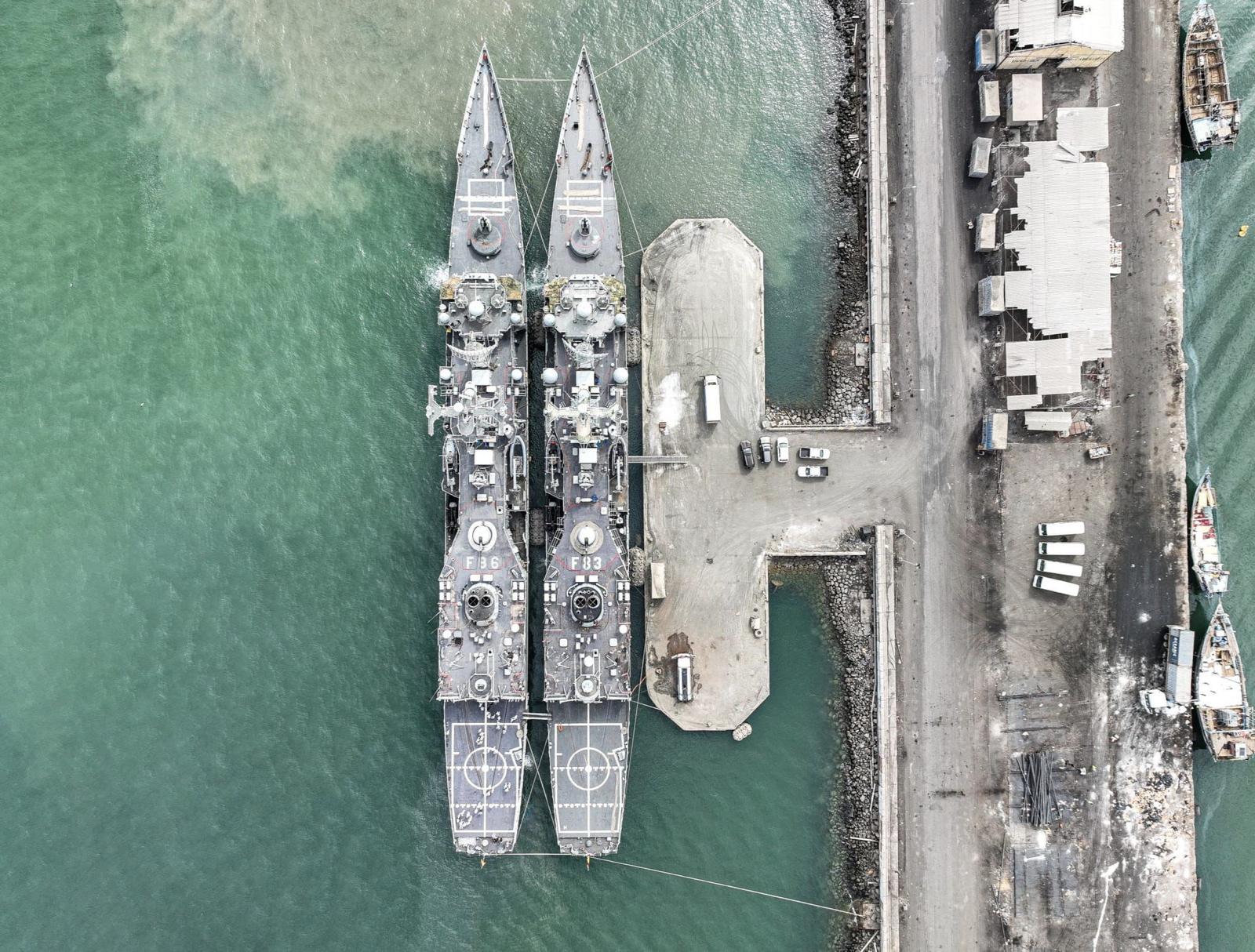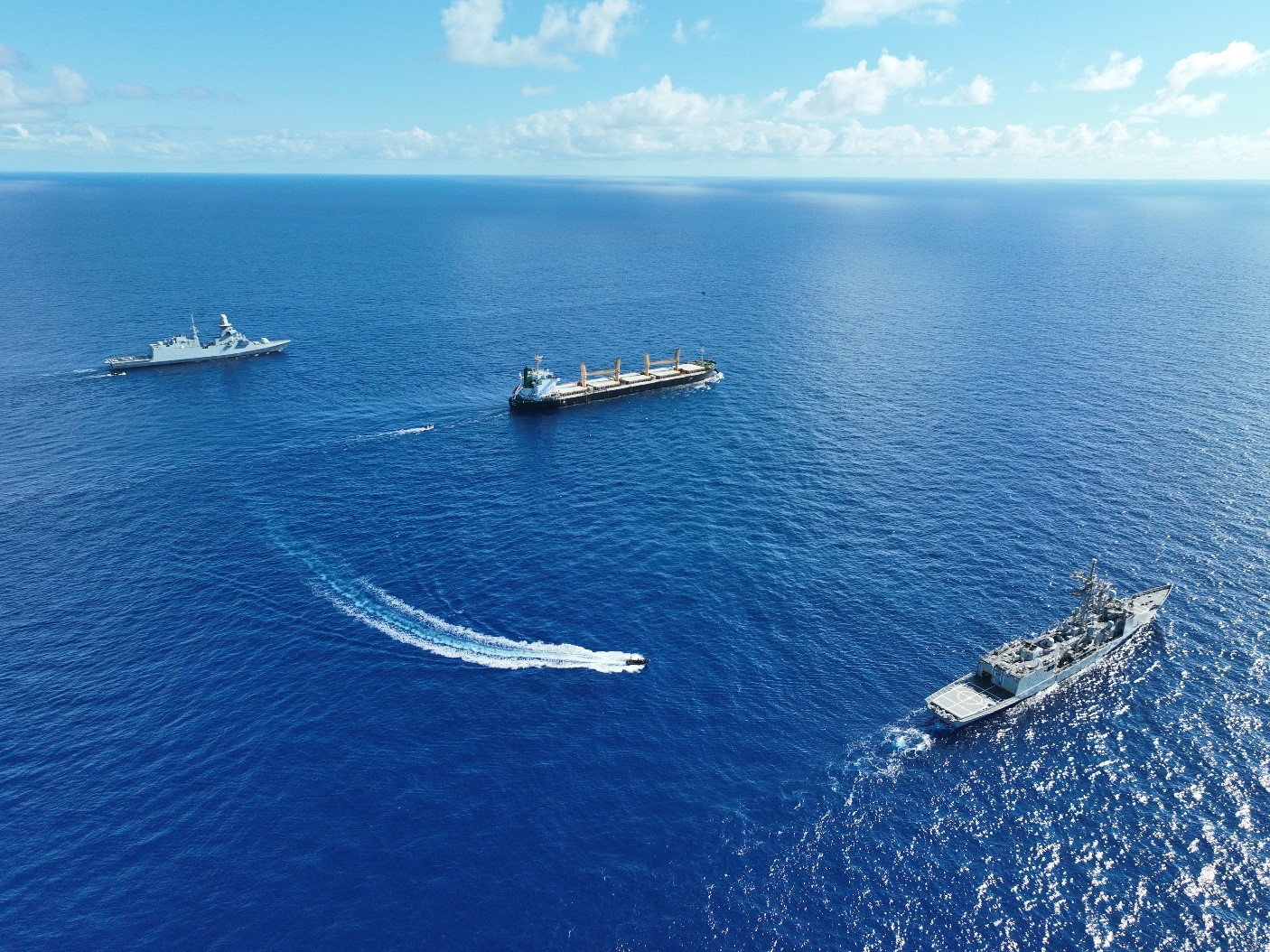
EU NAVFOR – ATALANTA OPERATION
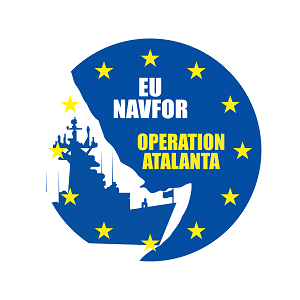
At the end of 2022, EUNAVFOR Operation ATALANTA was extended until December 2024 with a new mandate reflecting the achievements, challenges and future of the Operation. EU Member States decided that the Operation should keep its main effort on the following missions: protecting World Food Programme (WFP) vessels and other vulnerable vessels transiting the region; deterring, preventing, and suppressing piracy and armed robbery in the Operations Area; monitoring fishing activities in the Horn of Africa and the Western Indian Ocean; fighting drug trafficking and assisting in the weapons embargo on Somalia, illegal trade in charcoal and illegal, unreported and unregulated fishing ("IUU fishing").
As ATALANTA is part of the EU's Comprehensive Support to the Horn of Africa, the Operation actively supports the 'sister missions' EUCAP-Somalia (EU Capacity Building - Somalia) and EUTM-Somalia (EU Training Mission - Somalia). It also maintains close links with EU representations throughout the area and contributes to the implementation of EU programmes aimed at improving the regional maritime security framework.
Furthermore, the new mandate expresses the will to establish a new relationship with EMASOH-AGENOR, by developing new ties and synergies with this operation, in which European countries are involved, focused on the Strait of Hormuz.
In fact, the new mandate sets the objective of making ATALANTA a reference throughout the North-West Indian Ocean as a maritime security provider in the region.
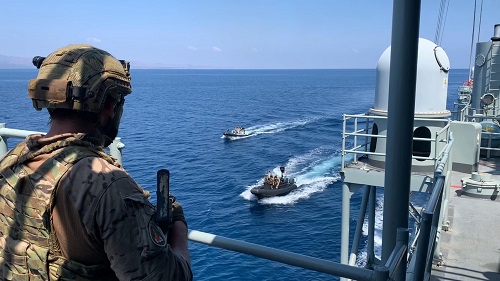
At the end of 2022, EUNAVFOR Operation ATALANTA was extended until December 2024 with a new mandate reflecting the achievements, challenges and future of the Operation. EU Member States decided that the Operation should keep its main effort on the following missions: protecting World Food Programme (WFP) vessels and other vulnerable vessels transiting the region; deterring, preventing, and suppressing piracy and armed robbery in the Operations Area; monitoring fishing activities in the Horn of Africa and the Western Indian Ocean; fighting drug trafficking and assisting in the weapons embargo on Somalia, illegal trade in charcoal and illegal, unreported and unregulated fishing ("IUU fishing").
As ATALANTA is part of the EU's Comprehensive Support to the Horn of Africa, the Operation actively supports the 'sister missions' EUCAP-Somalia (EU Capacity Building - Somalia) and EUTM-Somalia (EU Training Mission - Somalia). It also maintains close links with EU representations throughout the area and contributes to the implementation of EU programmes aimed at improving the regional maritime security framework.
Furthermore, the new mandate expresses the will to establish a new relationship with EMASOH-AGENOR, by developing new ties and synergies with this operation, in which European countries are involved, focused on the Strait of Hormuz.
In fact, the new mandate sets the objective of making ATALANTA a reference throughout the North-West Indian Ocean as a maritime security provider in the region.
MANDATE
At the end of 2008, the European Union Council adopted Resolution 2008/851/CFSP, based on various UN resolutions, to establish the EU maritime military operation - ATALANTA Operation to contribute to the deterrence, prevention, and repression of piracy and armed robbery off the coast of Somalia. Over time, the mandate of EU NAVFOR has been adapted to reflect the evolving situation in the region and the increased presence of the International Community, with the aim of developing the Operation into a provider of maritime security in the North-West Indian Ocean.
On 12 December 2022, EU Council Decision (CFSP) 2022/2441 amended the tasks of ATALANTA as follows:
- Executive tasks:
- PROTECT belonging to the World Food Programme and other vulnerable vessels.
- DETECT, PREVENT, and REPRESS piracy and armed robbery at sea in the area of operations.
- CONTRIBUTE to the DISRUPTION of drug and arms trafficking.
- Non-executive tasks:
- CONTRIBUTE to the monitoring of drug trafficking, arms trafficking, suspected IUU fishing and illegal charcoal trade in the area of operations within existing means and capabilities.
- CONTRIBUTE to the EU's integrated approach in Somalia and to relevant activities of the international community, by helping to address the root causes of piracy and its network, upon request and within existing means and capabilities.
- SUPPORT other EU missions, programmes and instruments in Somalia within existing means and capabilities. In particular, in close coordination with EUTM Somalia, EUCAP Somalia and the Coordinated Maritime Presences in the North-West Indian Ocean.
- SUPPORT the promotion of the overall regional maritime security architecture, the relevant programmes implemented by the Commission within existing means and capabilities and reinforce the links already developed with the Regional Maritime Information Fusion Centre of Madagascar and the Regional Operational Coordination Centre of Seychelles.
- COOPERATE with Operation AGENOR and develop further synergies with the European-led Maritime Situation Monitoring in the Strait of Hormuz, within its means and capabilities and within the limits of this new mandate.
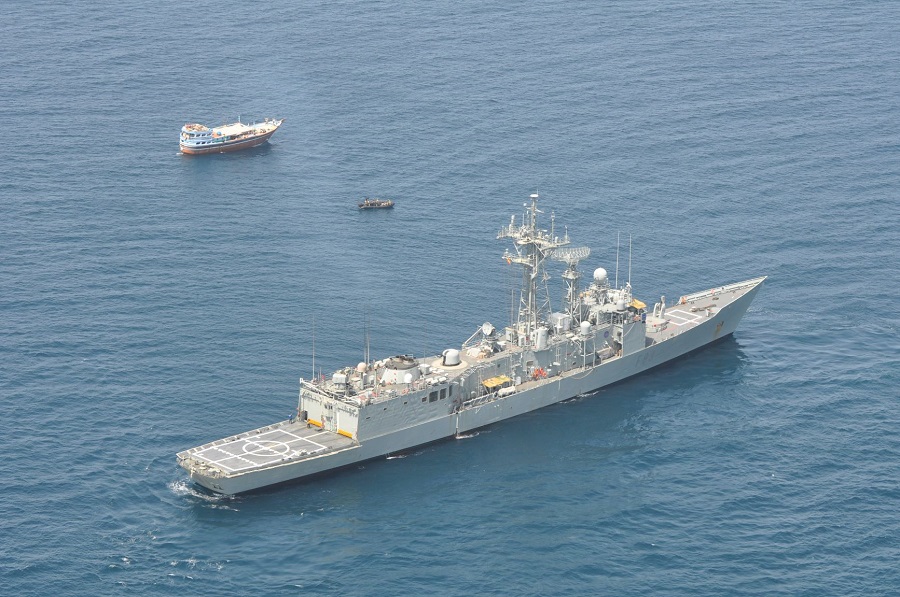
Data collected since 2008 shows that EU NAVFOR, in cooperation with its partners in the fight against piracy, has been highly effective in preventing attacks before they occur.
Overall, both the operations carried out by the Operation and the continued effort to advise the International Shipping Industry and the Merchant Community of the importance of self-protection measures have drastically reduced the success rate of attacks in the Area of Operations.
At the height of piracy in the region in January 2011, piracy networks held up to 736 hostages and 32 vessels. Since its deployment in 2008 as the first EU naval operation, EU NAVFOR ATALANTA:
- It has a 100% success rate in protecting WFP ships delivering humanitarian aid to displaced persons and refugees in Somalia.
- Ensures the protection of vulnerable vessels within the Area of Operations.
- It deters, prevents and represses acts of piracy and armed robbery at sea.
- It cooperates and responds to illicit maritime flows, including illicit trade that finances terrorism.
- It supports the EU's Integrated Approach to the Horn of Africa together with its two EU sister missions, EUCAP Somalia and EU TM Somalia, as well as the EU Delegations in the countries within the Area of Operations and the EU Special Representative in the Horn of Africa.
- It acts as a key tool in the EU's Indo-Pacific Naval Diplomacy.
- It cooperates with and supports all international organisations, naval forces and independent deployed forces present in the Area of Operations, such as CMF (Combined Maritime Forces - Bahrain) and EMASOH.
- It provides a single legal framework for transferring pirates to regional states for prosecution.
In addition, EU NAVFOR has conducted and supported numerous Saving Lives at Sea rescue missions (SOLAS actions) in the area, assisting local, regional and international merchant and fishing vessels in need.
WHERE EU NAVFOR OPERATES
The EUNAVFOR ATALANTA - AOO Area of Operations, according to the new mandate, includes (map attached):
- The Gulf of Aden and neighbouring countries, including the port and city of Muscat (Oman).
- Somali Basin.
- Red Sea.
- The Gulf of Suez.
- The Gulf of Aqaba.
Within this area, EU NAVFOR units carry out their tasks in line with the established mandate, currently for the period 2023-2024. Close cooperation with WFP ensures that no vessel carrying humanitarian aid travels unprotected in the region.
EU NAVFOR assets also conduct patrols in the International Recommended Transit Corridor (IRTC) in the Gulf of Aden and the rest of the Western Indian Ocean included in the AOO.
In addition, warships and air assets conduct regular reconnaissance and surveillance operations. Warships and their boarding teams routinely carry out visual or on-board checks of vessels transiting the area.
Meetings are held with local seafarers, the so-called "Friendly Approaches", to learn more about maritime practices directly from the crews of fishing and merchant vessels in the region. Likewise, the Masters of these vessels are urged to take into account the Good Practices Manual (BMP version 5) and to register in the Voluntary Registration System (VRS) of the Maritime Security Center for the Horn of Africa (MSCHOA, which reports to the Operation Headquarters). These are the best measures to achieve safe navigation and enable immediate assistance in case of need.
In addition, EU NAVFOR vessels have and will come to the aid of vessels in distress, whether from an assault, attack or because the vessel is in another emergency situation at sea.
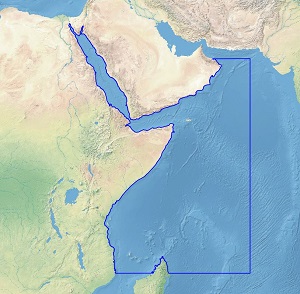
EU NAVFOR operates in an Area of Operations covering the Southern Red Sea, the Gulf of Aden and a large part of the Indian Ocean, including the Seychelles, Mauritius and Comoros. The Area of Operations also includes the Somali coastal territory, as well as its territorial and internal waters. This represents an area of about 4,700,000 square nautical miles (approximately 8,700,000 square kilometres).
Within the Area of Operations, EU NAVFOR units conduct tasks in accordance with the Mandate. Close co-operation with WFP and AMISOM ensures that no vessel transporting humanitarian aid (or logistics for the African Union mission) will travel unprotected along the Somali coastline.
EU NAVFOR warships also conduct patrols in the Internationally Recommended Transit Corridor (IRTC) in the Gulf of Aden and the Indian Ocean.
Furthermore, warships and Maritime Patrol and Reconnaissance Aircraft (MPRA) conduct reconnaissance and surveillance operations. Warships and their boarding teams routinely conduct visual or physical checks of vessels transiting the High Risk Area.
Meetings with local seafarers, or ‘friendly approaches’, are conducted to gather a better understanding of maritime practices by talking with the crews of fishing and trading vessels in the region and to make ships’ masters aware of the Best Management Practices (BMP) for protection against Somali-based piracy, i.e. self-protection measures.
A significant objective of EU NAVFOR is the deterrence and disruption of acts of piracy and armed robbery on the high seas. Warships apprehend suspected pirates following intelligence reports of pirate activity or sightings by merchant vessels and MPRAs.
When EU NAVFOR assets locate suspicious vessels, and further investigation confirms the suspicion, the pirate groups will be disrupted. This means action will be taken in order to render a suspected group incapable of further pirate operations. Suspected pirates may be detained with the aim to transfer them to competent national authorities for prosecution. Their equipment is often confiscated for evidence purposes. A disruption of a pirate logistics dump was also carried out on the Somali coastline as part of a focused and deliberate operation in May 2012.
In addition, EU NAVFOR warships regularly come to the aid of vessels in distress, either because of a pirate attack or because the vessel is otherwise in an emergency situation at sea.
EU NAVFOR assets also support UN Food and Agriculture Organization (FAO)’s programmes to monitor fishing activity in the area.

EU NAVFOR is based on European Union Council Resolutions, which in turn are based on United Nations Security Council Resolutions (UNSCR) and international law.
In relation to persons suspected of unlawful acts on which the Operation may act under its current mandate, the legal framework is:
- At the international level: the UN Convention on the Law of the Sea, the 1988 Vienna Convention against Illicit Traffic in Narcotic Drugs and Psychotropic Substances, UNSCR 2662 (2022) on the arms embargo and the export of charcoal to Somalia.
- At EU level: Council Joint Action 2008/851/CFSP on Operation ATALANTA (also known as the EU Mandate) and other Council Decisions and Regulations relating to EU legislation.
- At the national level: the laws and regulations of nations contributing troops and assets to Operation ATALANTA, and the laws of the host states in the area of operations.
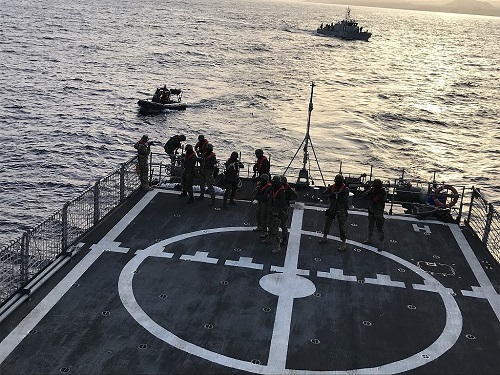
Atalanta Opertation is part of Spain's commitment, under the flag of the European Union, to keep security in the Gulf of Aden waters and the Western Indian Ocean, protecting World Food Programme vessels and keeping vulnerable maritime traffic safe.
The transfer of the Operational Headquarters (OHQ) from the British city of Northwood, London (United Kingdom) to the Rota Naval Base in Cadiz, Spain, was formalised on 29 March 2019, following the United Kingdom's exit from the European Union.
The Operation Commander leads the ES-OHQ, which is ready to be used at all times, and to exercise command of any operation or mission of the Common Security and Defence Policy. This command was assumed by Vice Admiral Ignacio Villanueva Serrano on 23rd November 2023 in Rota.
Spain is currently contributing to Operation Atlanta with approximately 350 military personnel and the following assets:
- A Frigate/War vessel.
- An onboard helicopter.
- A Special Operations team on board.
- Detachment Orion in Djibouti, which can rely on a maritime reconnaissance and surveillance aircraft and approximately 20 air force personnel.
- The Operation Headquarters, OHQ, at the Rota Naval Base.
- Four Liaison Officers located in Mogadishu (Somalia), Manama (Bahrain), Brussels (Belgium) and Port Victoria (Seychelles).
- Personnel in the Logistics Support Unit for the Operation deployed in Djibouti.
STRATCOM VIDEOS ON EUNAVFOR ATALANTA
Friendly approach to a fish boatYoutube video Destachment Orion in Djibuti: P3 'Orion' flightYoutube video Frigate F-85 'Navarra': Vessel monitoring in Operation AtalantaYoutube video Frigate F-84 'Reina Sofía': flying a 'Scan Eagle' UAV within EUNAVFOR 'Atalanta'Youtube video
2024
- June 10th. The frigate ‘Numancia’ (F-83) takes over from the ‘Canarias’ (F-86) in command of Operation ‘Atalanta’.
- June 3rd. The 50th Contigent of the "Orion" Detachment of "Atalanta Operation" is relieved by the 51st Contigent.
- March 5th. The 49th Contigent of the "Orion" Detachment of "Atalanta Operation" is relieved by the 50th Contigent.
- February 21st .The frigate 'Canarias' (F-86) takes over from the 'Victoria' (F-82)) in Operation Atalanta.
2023
- November 23rd. Vice Admiral Jose M. Nuñez Torrente hands over command of Operation ATALANTA to Vice Admiral Ignacio Villanueva Serrano.
- October 21st. The frigate 'Victoria' (F-82) takes over from the 'Navarra' (F-85) in Operation Atalanta.
- September 14th.The 48º contingent begins a surveillance and reconnaissance work in the Indian Ocean, Lt. Colonel Jose A. Quesada Jiménez is the new head of DAT 'Orion'.
- June 15th. ESP frigate F-85 'Navarra' hands over from ESP frigate 'Reina Sofía' F-84 as Atalanta's new flagship..
- June 5th. The 47º contingent begins a surveillance and reconnaissance work in the Indian Ocean, comander Victor Martinez Aisa is the new head of DAT 'Orion'.
- February 15th. Spanish ESPS 'Reina Sofía-F 84' hands over from frigate 'Santa María F 81' as Atalanta's new flagship.
2022
- 12 December 2022. The CSDP renews ATALANTA's mandate until December 2024, updating its tasks and objectives to the new needs demanded by the operational and strategic situation in the region.
- September 22nd. The 44th contingent begins surveillance and reconnaissance work in the Indian Ocean, colonel Pedro Luis Pablo Asensio is the new head of DAT 'Orion'.
- June 16th. ESP frigate F-83 'Numancia' hands over from ESPS 'Canarias' within EUNAVFOR ATALANTA.
- May 18th. The 43rd continent of the DAT 'Orion' begins its surveillance work, colonel Fco. José Vela García is its chief.
- February 15th. Spanish ESPS 'Canarias' hands over from frigate 'Victoria' as Atalanta's new flagship.
- January 17th. 42st Air Force rotation hands over within the 'Marfil' Detachment.
2021
- October 16th. Frigate 'Victoria' hand over from frigate 'Navarra' as Atalanta's Flagship.
- September 20th. 41st Air Force rotation hands over within the 'Marfil' Detachment.
- August 5th. Spanish rear admiral Alejandro Cuerda Lorenzo takes over the command of the naval and air units involved in Operation 'Atalanta'.
- July 15th and 16. ESP CHOD visits Spanish troops deployed in Operation 'Atalanta'.
- June 3th. Frigate 'Navarra' begins its activities as part of EUNAVFOR 'Atalanta'.
- April 21st. Vice admiral José María Núñez Torrente takes over from vice admiral Eugenio Díaz del Río Jáudenes as ES-OHQ in Rota.
- April 20th. Spanish Air Force replaces DAT 'Orion' P-3 aircraft, to keep countering piracy within operation Atalanta.
- February 19th. vice admiral Eugenio Díaz del Río Jáudenes takes over ES-OHQ command from major general Antonio Planells Palau in Rota.
- February 15th. Spanish vessel 'Castilla' joins EUNAVFOR ATALANATA as Operation's flagship.
- January 1st. Under CFSP Decision 2020/2188, mandate of EU NAVFOR Somalia is extended until December 31, 2022.
2020
- December 16th. Spanish CHOD visits frigate 'Reina Sofía' and Air Detachment 'Orión'
- October 15th. Frigate “Reina Sofía” relieves frigate “Santa María” in the operation Atalanta in the waters of the Indian Ocean.
- September 20th. A P3 from the 22nd group takes off from the French base in Djibouti bound for Spain, carrying airmen from the 71st rotation of the 'Orion' detachment, within the framework of the EU Naval Force's Operation Atalanta in Somalia.
- September 20th. An A310 from the 45th group lands in Djibouti with the personnel belonging to the 38th contingent assigned to the ‘Orion’ detachment which will carry out the relevant missions within Operation Atalanta.
- August 27th. Force change of command of "Operation Atalanta". Rear Admiral Ignacio Villanueva hands over command to his Italian counterpart, who will act as commander from the frigate "Luigi Rizzo"
- July 26th. A P3 airplane from Spain lands in Djibouti carrying airmen belonging to the 71st rotation of Detachment 'ORION' to keep carrying out their duties within Operation 'ATALANTA'.
- May 27th. The 37th contingent of Detachment 'ORION' takes over within Operation ‘ATALANTA’. Spanish Armed Forces keep their commitment with the 'ATALANTA' despite the COVID-19 pandemic.
- May 6th. Spain takes command of Operation ‘ATALANTA’. Rear Admiral Ignacio Villanueva Serrano takes over from the Spanish frigate ‘Numancia’.
- February 17th. The frigate 'Numancia' took over from the 'Victory' in Djibouti. This is the third time that this Navy vessel is deployed in the European Union operation.
- February 4th. Orion detachment, deployed in Djibouti; transfer of authority between the 68th and 69th rotations.
2019
- July 24. The 35th Contingent takes full responsibility for the “Orión” detachment in Yibuti.
- July 23. “Canarias” frigate takes over from “Navarra” frigate.
- March 27. The 34th Contingent of the Spanish Air Force Orión Detachment has taken over command in Djibouti. The new contingent, whose relief overlaps the 64th rotation, is composed by 60 soldiers and is under the command of Lieutenant colonel Jaime Peñuela, replacing Lieutenant colonel Marín Rodríguez.
- On 10th March, FFG (F85) “Navarra” frigate is deployed, taking over from “Relámpago” meteoro-class offshore patrol vessel (BAM in Spanish). From 10th March to 23rd July, Spain has taken over the command of the Force Headquarters (FHQ) from the European Union Naval Force Mediterranean Operation, leading from the F-85 Navarra, under the command of Rear Admiral Ricardo Atanasio Hernández López.
2018
- December 6. “Relámpago” meteoro-class offshore patrol vessel (BAM) takes over from “Castilla” amphibious assault ship (BAA in Spanish), and it has been integrated into the European Union Naval Force (EUNAVFOR) for its participation in operation Atalanta against piracy. “Relámpago” has stayed in the area of operations in the Indian Ocean until March.
- August 6. Spain takes over the Force command by using the amphibious assault ship as a command ship.
- July 30. The EU Council extends the command of operation Atalanta, EU NAVFOR Somalia until 31st December 2020. On 29th March 2019, the Council also decided to relocate the operating headquarters of the European Union Naval Force (EU NAVFOR) from Northwood (UK) to Rota (Spain). On the same date, Vice admiral Antonio Martorell Lacave of the Spanish Army was appointed as the new Operation Commander. Both the relocation and change of command were necessary due to the UK decision to leave the EU.
- April 23. “Meteoro” meteoro-class offshore patrol vessel (BAM), whose military base is located in the Arsenal of Las Palmas, has taken over from “Patiño” replenishment oiler (BAC in Spanish) within the framework of the operation Atalanta.
2017
- December 28. Participation is extended till 31st December 2018. Up to 375 troops take part in the operation.
- February 24. Spain takes the command of the operation till 27th July. “Galicia” amphibious assault ship acts as a flagship.
2015
- April 6. Spain takes over the Force command of the operation till 6th August. “Galicia” amphibious assault ship acts as the command ship.
2012
- December 6. Spain takes over the command of the operation till 6th April 2013. “Méndez Núñez” frigate acts as the command ship.
- August. For the first time in the Indian Ocean, Spain deploys “Relámpago”, one of its new offshore patrol vessels.
2011
- September 10. “Galicia” ship releases a French citizen and arrests the hijackers.
- September 5. Spain takes over the Force command of operation Atalanta.
2010
- December 14. Spain takes over the command of operation Atalanta.
- February 25: Atalanta´s functions are extended, including port and pirate´s headquarters control.
2009
- October 2. Hijacking of the Basque fishing “Alakrana”. Spain sent a frigate to the south to protect the tuna fleet.
- April 6. Our country takes over for the first time the Force command.
- January 23. Spain sent the first ship to the area, “Victoria” frigate.
- January 23. The Council of Ministers approves Spanish participation in the operation.
- January 21. The Congress of Deputies authorizes sending a Spanish contingent to Atalanta.
2008
- December 8. Operation Atalanta is started.
- November 10. The European Union approves the creation of a naval air force.
- September 23. “Orión” maritime surveillance aircraft P-3 is sent by Spain to Djibouti.
EMAD PRESS RELEASES ON OPERATION 'ATALANTA'
-
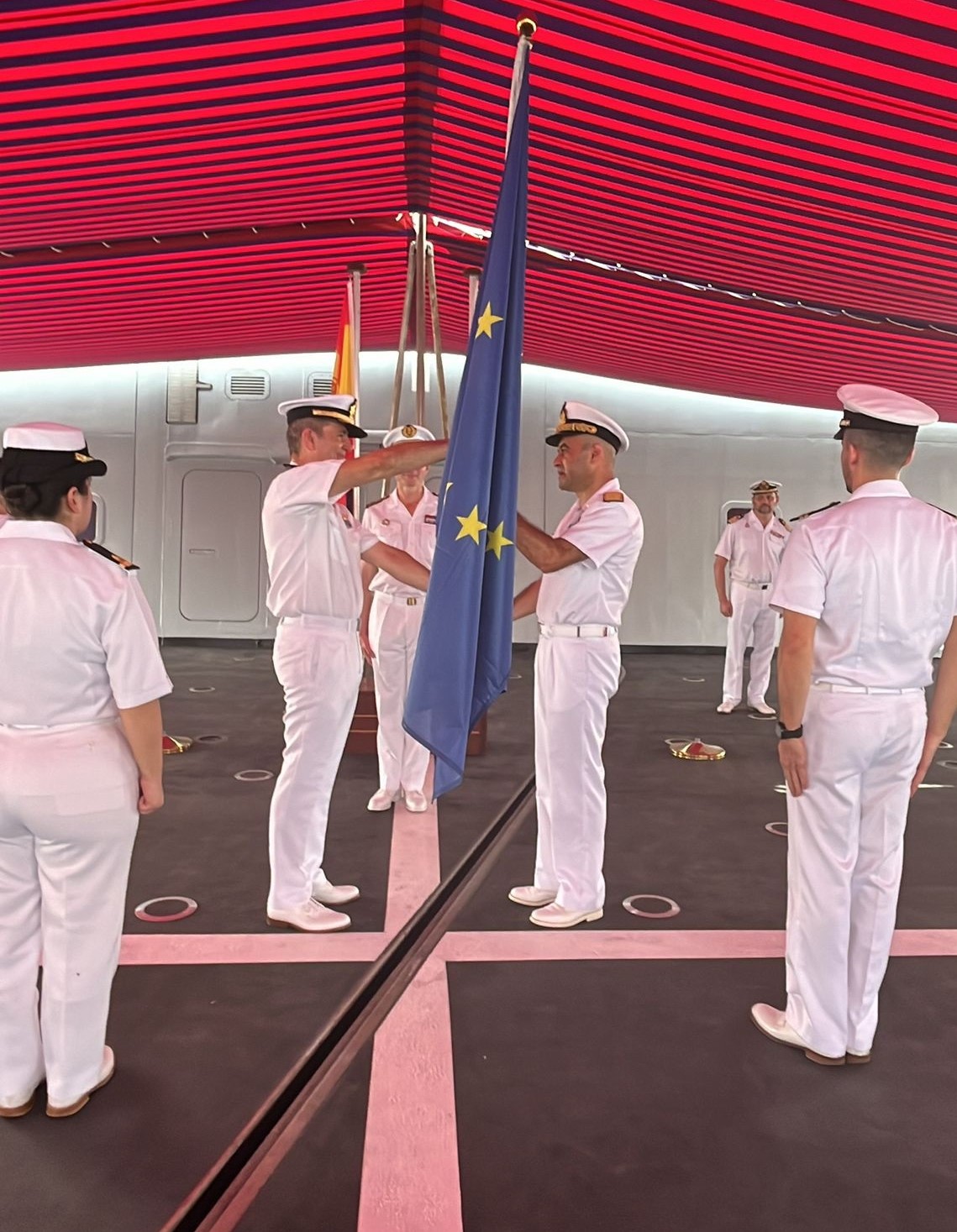
Spain takes command of the ‘Atalanta’ operation
Spain takes command of the ‘Atalanta’ operation
2024/06/21In Djibouti
More information -
The frigate ‘Numancia’ takes over from the frigate ‘Canarias’ in Operation ‘EUNAVFOR Atalanta’
The frigate ‘Numancia’ takes over from the frigate ‘Canarias’ in Operation ‘EUNAVFOR Atalanta’
2024/06/11In Djibouti
More information -
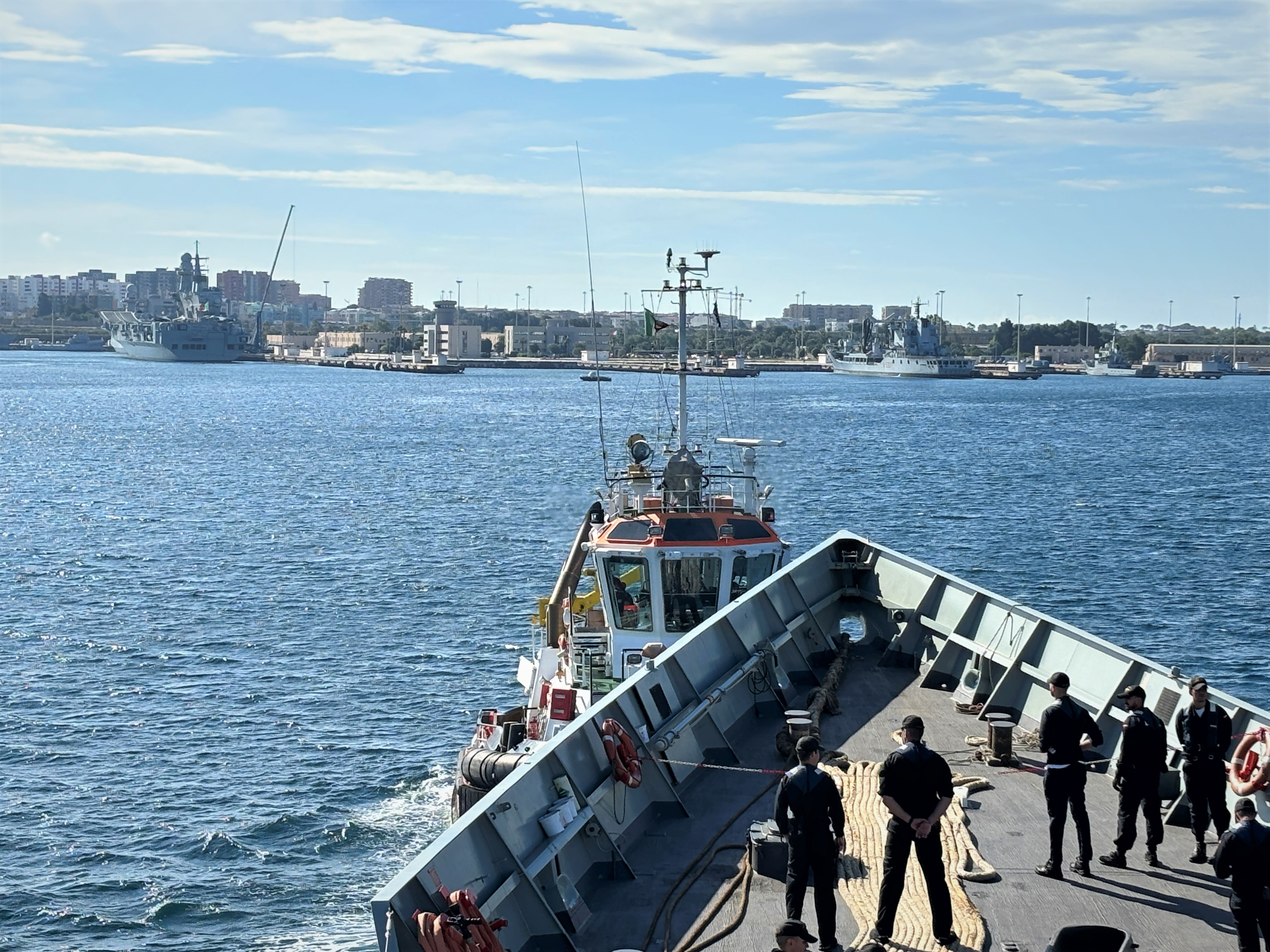
'Numancia' frigate is temporarily integrated within the Italian aircraft carrier group 'Cavour'
'Numancia' frigate is temporarily integrated within the Italian aircraft carrier group 'Cavour'
2024/06/06At sea
More information -
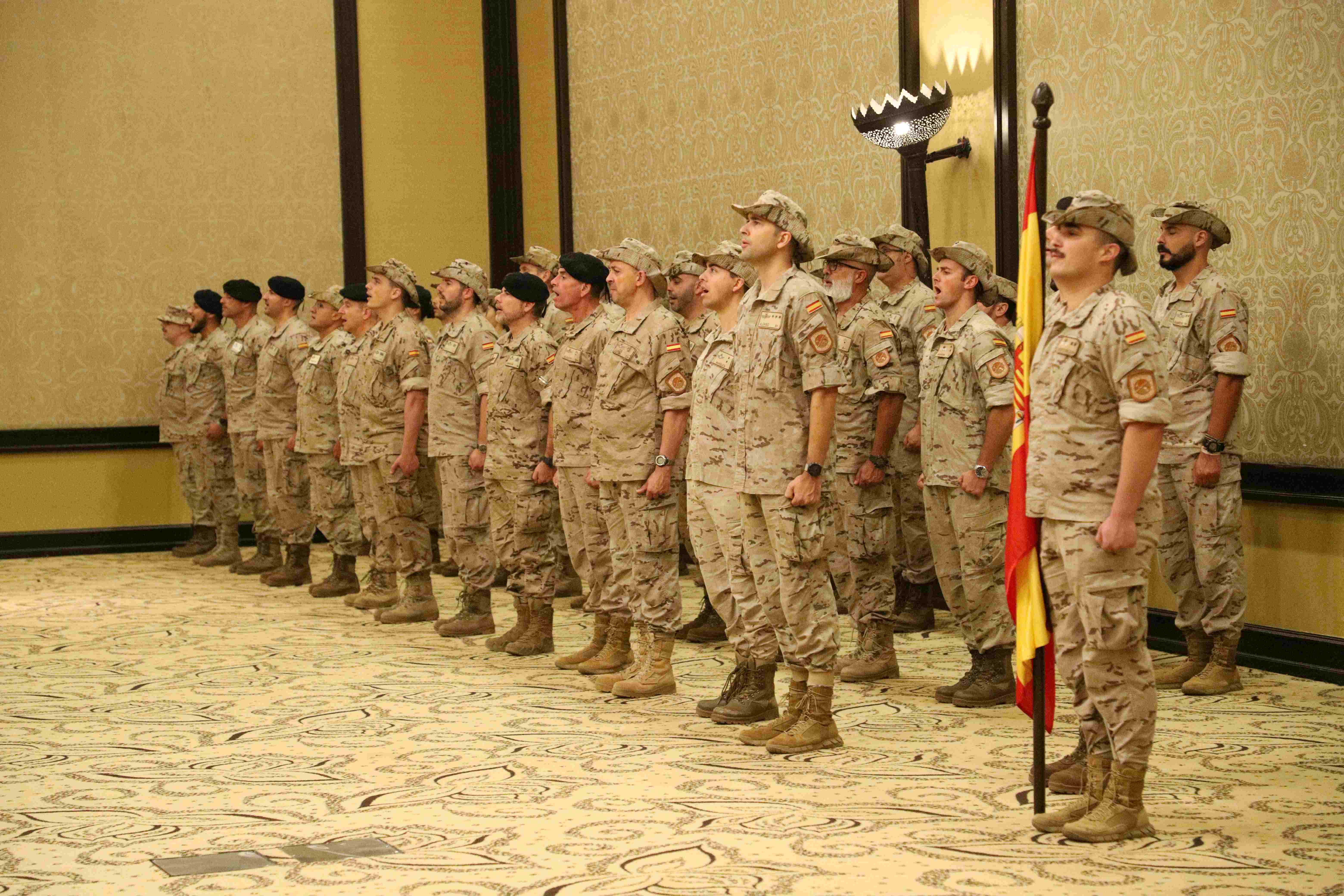
Take-over of personnel deployed to Tactical Air Detachment ‘Orion’
Take-over of personnel deployed to Tactical Air Detachment ‘Orion’
2024/06/04In Djibouti
More information -

The frigate F-83 ‘Numancia’ sets sail to join Operation ‘Atalanta’.
The frigate F-83 ‘Numancia’ sets sail to join Operation ‘Atalanta’.
2024/05/30At sea
More information -
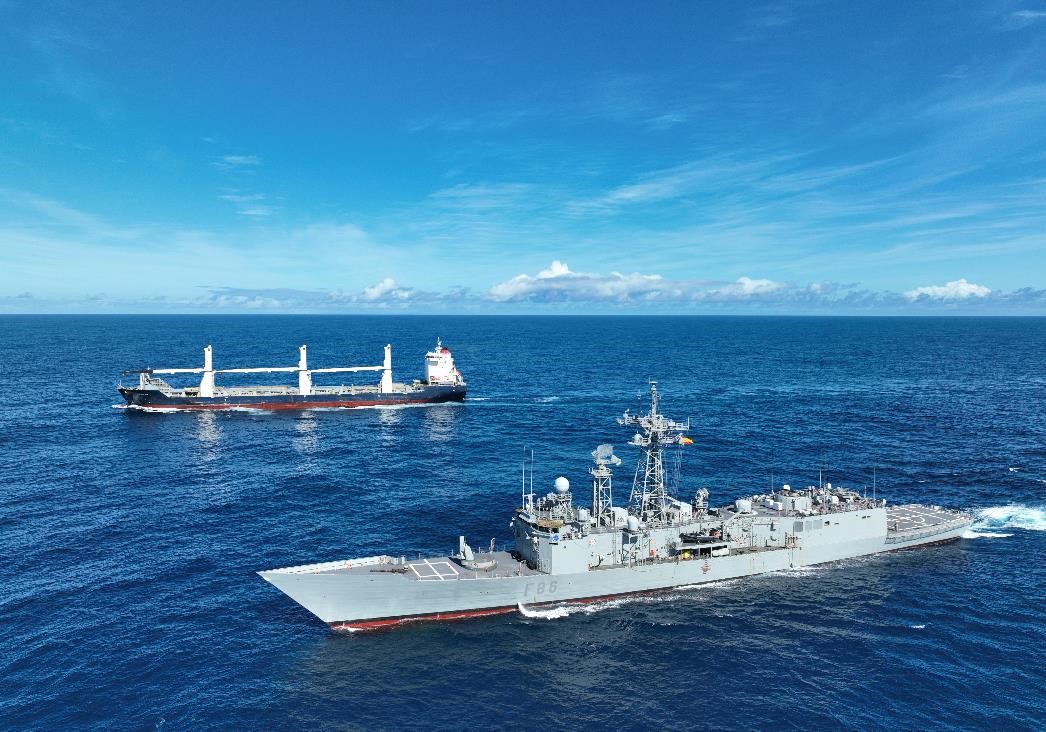
The frigate F-86 ‘Canarias’ takes action again in an attempted kidnapping of a merchant ship
The frigate F-86 ‘Canarias’ takes action again in an attempted kidnapping of a merchant ship
2024/05/24At sea
More information -
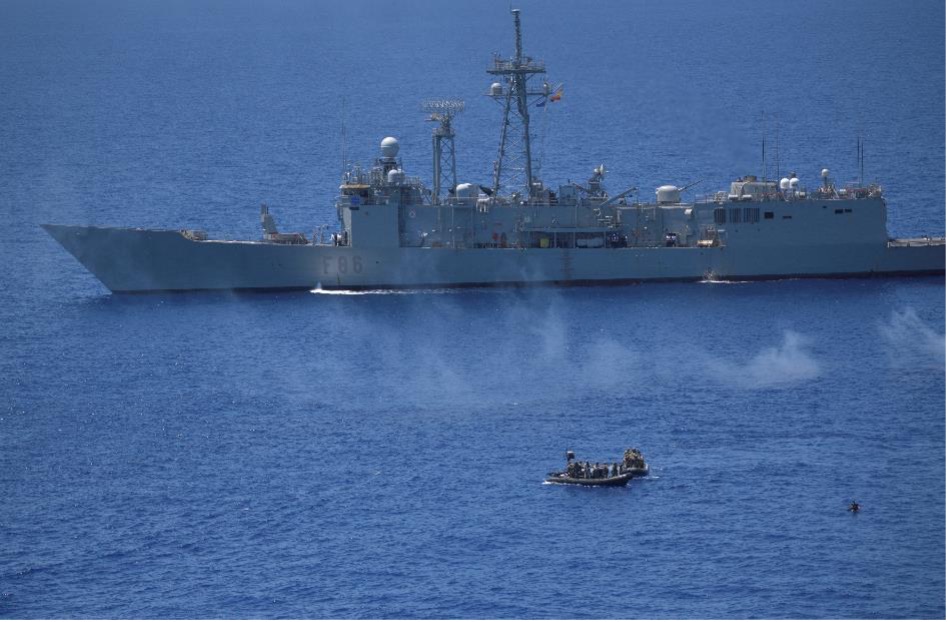
The frigate F-86 ‘Canarias’, integrated in Operation Eunavfor Atalanta, hands over six suspected pirates to the Seychelles authorities
The frigate F-86 ‘Canarias’, integrated in Operation Eunavfor Atalanta, hands over six suspected pirates to the Seychelles authorities
2024/05/15In Seychelles
More information -
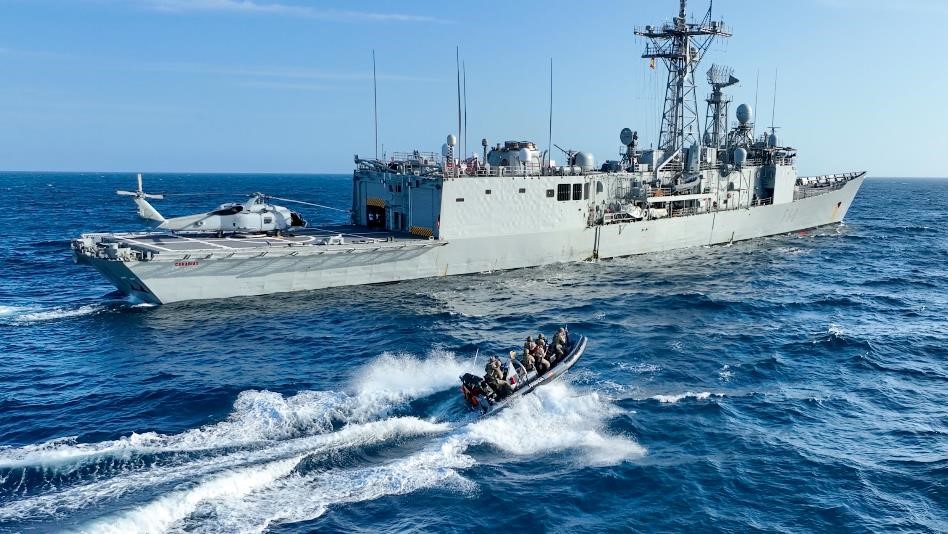
The frigate 'Canarias' ends its longest patrol in which it has taken part in numerous activities
The frigate 'Canarias' ends its longest patrol in which it has taken part in numerous activities
2024/05/10In Djibouti
More information -
The frigate F-86 'Canarias' assists in the liberation of a ship hijacked by pirates in Somalia waters
The frigate F-86 'Canarias' assists in the liberation of a ship hijacked by pirates in Somalia waters
2024/04/15In the Indian Ocean
More information -
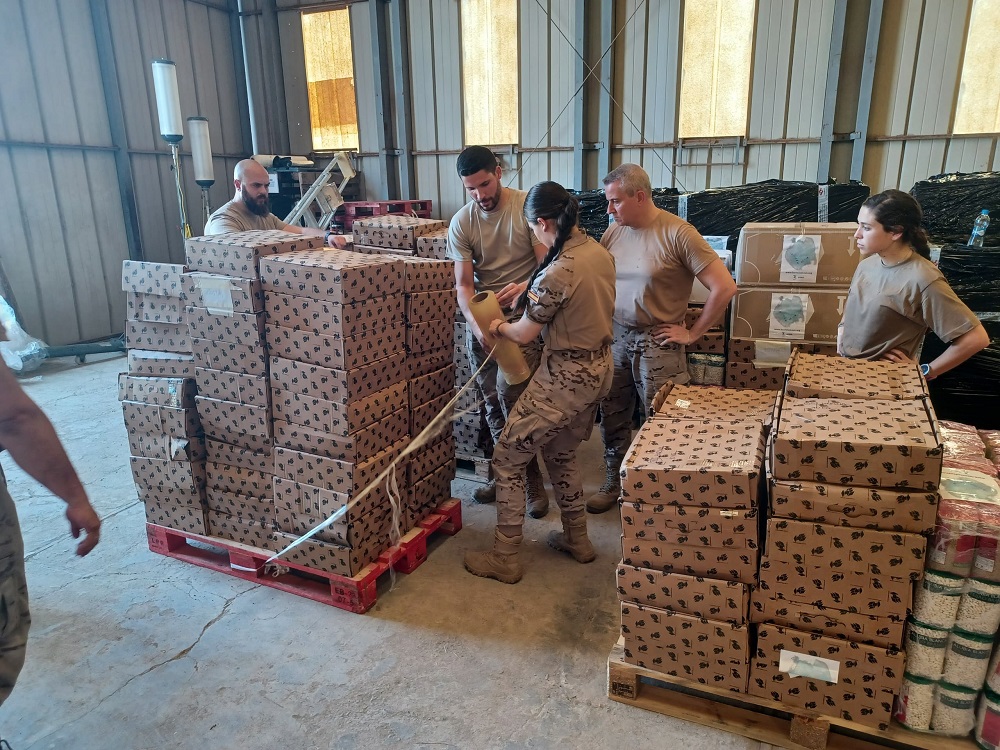
DELIVERY OF DONATIONS FROM AYO'S STELA CONTINUES
DELIVERY OF DONATIONS FROM AYO'S STELA CONTINUES
2024/03/26In Yibuti
More information


